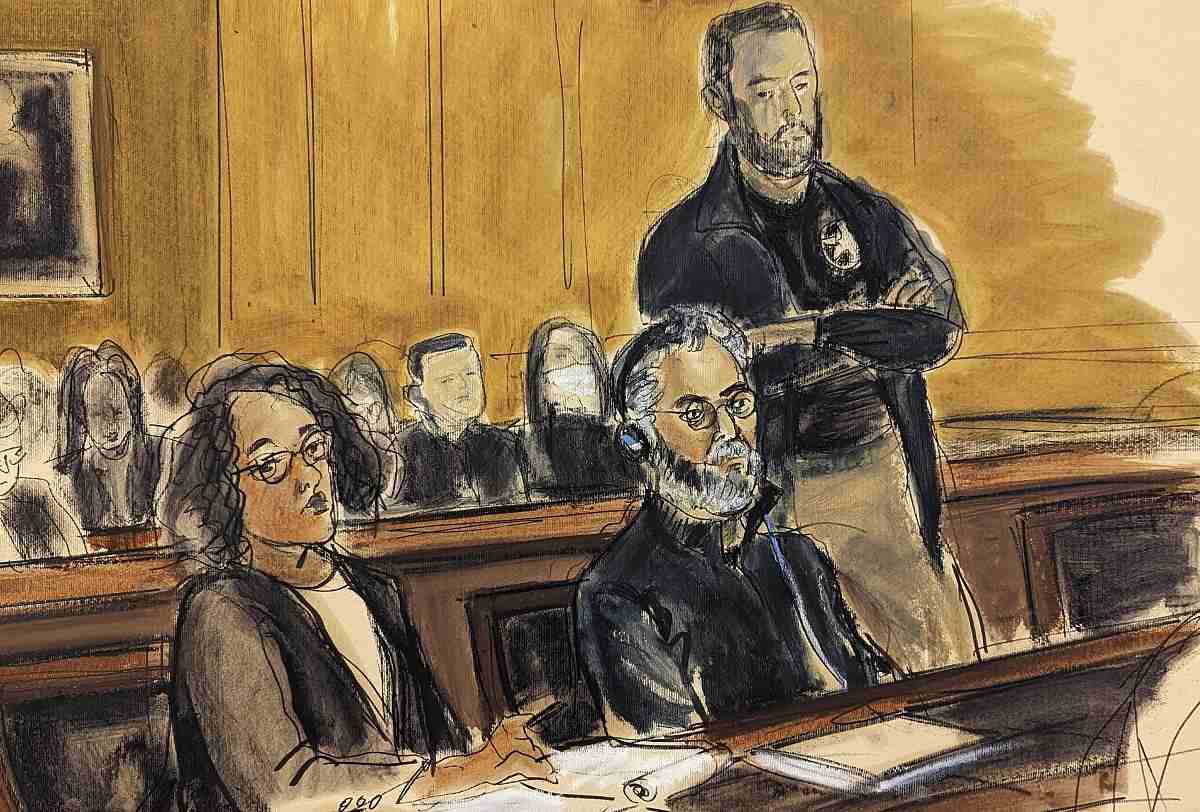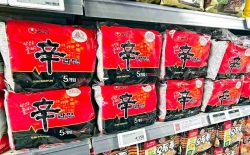Self-exiled Chinese Billionaire Guo Wengui Convicted of Defrauding Followers after Fleeing to US

In this courtroom sketch, Guo Wengui, seated center, and his attorney, Tamara Giwa, left, appear in federal court in New York, March 15, 2023.
16:12 JST, July 17, 2024
NEW YORK (AP) — Guo Wengui, a self-exiled Chinese business tycoon whose criticism of the Communist Party won him legions of online followers and powerful friends in the American conservative movement, was convicted by a U.S. jury Tuesday of engaging in a massive multiyear fraud that ripped off some of his most devoted fans.
Once believed to be among the richest people in China, Guo was arrested in New York in March of 2023 and accused of operating a racketeering enterprise that stretched from 2018 through 2023.
Over a seven-week trial, he was accused of deceiving thousands of people who put money into bogus investments and using the money to preserve a luxurious lifestyle. He was convicted of nine of 12 criminal counts, including racketeering conspiracy.
Guo’s lawyers said prosecutors hadn’t proven he’d cheated anyone. After the verdict, one of his attorneys declined to comment.
In a statement after the verdict, U.S. Attorney Damian Williams said Guo’s interrelated fraud schemes were “all designed to fleece his loyal followers out of their hard-earned money so that Guo could spend his days in his 50,000 square foot mansion, driving his $1 million Lamborghini, or lounging on his $37 million yacht.”
He added: “Thousands of Guo’s online followers were victimized so that Guo could live of a life of excess.”
Guo, who is also known by the name Miles Kwok, left China in 2014 during an anticorruption crackdown that ensnared people close to him, including a top intelligence official.
Chinese authorities accused him of rape, kidnapping, bribery and other crimes, but Guo said those allegations were false and designed to punish him for publicly revealing corruption as he criticized leading figures in the Communist Party.
He applied for political asylum in the U.S., moved to a luxury apartment overlooking Central Park and joined former President Donald Trump’s Mar-a-Lago golf club in Florida.
While living in New York, Guo developed a close relationship with Trump’s onetime political strategist, Steve Bannon. In 2020, the two announced a joint initiative to overthrow the Chinese government.
Prosecutors say hundreds of thousands of people were convinced to invest more than $1 billion in entities Guo controlled. Among those businesses and organizations was Guo’s media company, GTV Media Group Inc., and his so-called Himalaya Farm Alliance and the Himalaya Exchange.
In a closing argument at the trial, Assistant U.S. Attorney Ryan Finkel said Guo “spouted devious lies to trick his followers into giving him money.”
He said Guo made hundreds of broadcasts and videos in which he promised followers that they would not lose money if they invested with him.
“I’m rich. I’ll take care of you,” the prosecutor said Guo told them.
Then, he said, Guo spent millions from investors on a lavish lifestyle for himself and his family that included a $1.1 million tortoise-shell jewelry box and some candlesticks, a million dollar chandelier, $36,000 mattresses, a $40,000 coffee table and a $250,000 antique rug, items kept at a family home in Mahwah, New Jersey.
Defense lawyer Sidhardha Kamaraju told the jury that prosecutors had presented a case “long on rhetoric but short on specifics, long on talk, but short on evidence.”
Kamaraju said Guo was the “founder and face” of a pro-Chinese democracy movement that attracted thousands of political dissidents. Kamaraju urged jurors to think about whether Guo would intentionally cheat his fellow movement members for money. He said prosecutors had failed to prove that “Mr. Guo took a penny with the intent to undermine the political movement he invested so much in.”
The lawyer did not deny that his client lived lavishly, with a luxury apartment that took up an entire floor in Manhattan; a home in Greenwich, Connecticut; a yacht and a jet. But he said prosecutors wanted jurors to take “leaps in logic” to find Guo guilty.
“It’s not a crime to be wealthy,” Kamaraju said. “It is not a crime to live in luxury or to spend money on nice things. It’s not a crime to have a yacht or a jet or to wear nice suits. It may not be our lifestyle. It may be odd. It may even be off-putting to some, but it’s not a crime.”
The prosecutor, Finkel, said everyone agreed that Guo was targeted by China’s Communist Party, but that did not give Guo “a license to rob from these people.”
Finkel said Guo also created a “blacklist” of his enemies and posted their personal information online. When the Securities and Exchange Commission investigated him, Guo organized protests against the agency and claimed that it had been infiltrated by China’s Communist Party. And when a bankruptcy trustee was appointed by a judge to represent Guo’s creditors, Finkel said Guo’s followers protested outside the home of the trustee’s children and outside an elementary school where one of them taught.
Top Articles in News Services
-

Prudential Life Expected to Face Inspection over Fraud
-

Japan’s Nikkei Stock Average Touches 58,000 as Yen, Jgbs Rally on Election Fallout (UPDATE 1)
-

Hong Kong Ex-Publisher Jimmy Lai’s Sentence Raises International Outcry as China Defends It
-

Trump Names Former Federal Reserve Governor Warsh as the Next Fed Chair, Replacing Powell
-

Suzuki Overtakes Nissan as Japan’s Third‑Largest Automaker in 2025
JN ACCESS RANKING
-

Japan Institute to Use Domestic Commercial Optical Lattice Clock to Set Japan Standard Time
-

Israeli Ambassador to Japan Speaks about Japan’s Role in the Reconstruction of Gaza
-

Man Infected with Measles May Have Come in Contact with Many People in Tokyo, Went to Store, Restaurant Around When Symptoms Emerged
-

China Eyes Rare Earth Foothold in Malaysia to Maintain Dominance, Counter Japan, U.S.
-

Prudential Life Insurance Plans to Fully Compensate for Damages Caused by Fraudulent Actions Without Waiting for Third-Party Committee Review

























